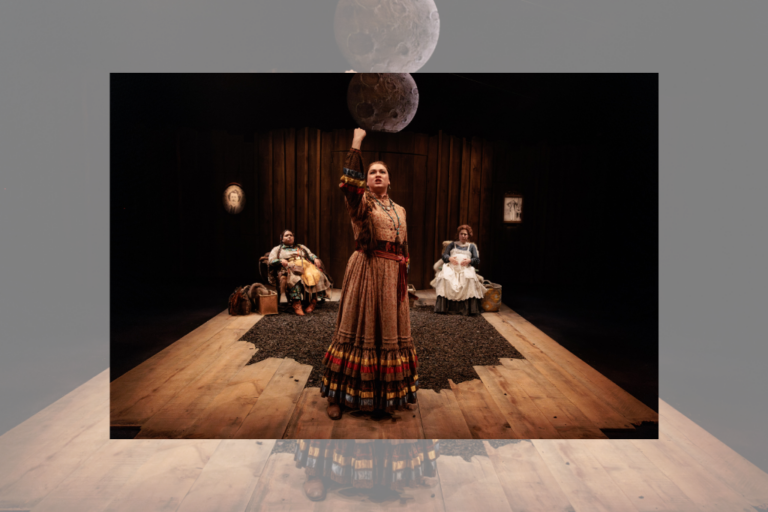REVIEW: Otîhêw at Shakespeare in Action
A volcanic eruption and violent colonial expansion has turned the world upside down. Without sun and moon, the realities of famine and smallpox unleash new fears that threaten to unravel the fabric of community.
Shakespeare in Action celebrates their 35th anniversary and their fifth year in Little Avenue Memorial Park with PJ Prudat’s Otîhêw, a Cree-Métis re-imagining of Shakespeare’s Othello.
The play is set in a northwestern factory fort along the Saskatchewan River in 1816, the year after the eruption of Mount Tambora that changed the global climate and caused a year without summer. Otîhêw (Nicole Joy-Fraser) is doing her best to lead her people through dark and terrifying times. She and her community are relatively affluent, able to support those who come to her fort in need. She is married to Desmond (Spencer Bennet), an Afro-Indigenous fur trader, and is the sister to the angry, scheming Hamish (Jonathon LeRose).
Hamish, like Iago, is jealous, and schemes to destroy Otîhêw and her marriage so that he may seize power for himself. But unlike in Othello, it’s her parents who gave Otîhêw her position of power. Hamish is vengeful and confused, a lost boy diving into the world of greed and misogyny, taking out his rage on his sister. He uses Inés (Jewell Bowry) to sow the seeds of jealousy with a linen kerchief, and endeavours to frame translator and valued community member Solomon (Raymond Jordan Johnson-Brown). A little Birdie (Brefny Caribou) sings, and this could-be tragedy is brought to its logical conclusion.
Unlike in traditional stagings of Othello, there is a delightful chorus of adorable sled dogs puppets by Clay & Paper Theatre, performed by Caribou, Bowry, Johnson-Brown, and LeRose. The chorus voices social anxieties, cracks jokes, generally breaks tensions throughout and, ultimately, reminds us to find humanity in others — including the wretched Hamish.
Prudat’s Otîhêw weaves elements of traditional storytelling into a Shakespearean framework — it’s a beautiful way to make Shakespeare relevant in a cross-cultural setting. Like the original, Otîhêw follows the themes of racism, greed, patriarchy, and misogyny, but Prudat offers how a Cree-Métis community led by women might handle betrayal, duty, love, and family/community bonds.
In Prudat’s world, the community is ruled by generosity and care. Otîhêw holds a deep responsibility to her community, using her affluence for the betterment of everyone. She is only rich when everyone is cared for and valued. Otîhêw’s knowledge of her world is respected by all — it’s the glue that holds everything together and helps people survive through famine and war. Even in his scheming and horrible ways, Hamish finds a way to take responsibility for his cruelty, and still have value in his own way — a refreshingly un-Shakespearean ending.
The ensemble, of varying experience levels, is a dream.They have an easy chemistry and work well together, the sled dog scenes highlighting their quick timing and comfort together. For me, both Fraser and Caribou’s performances are standouts.The cadence of their speech, with Fraser as an elder and Caribou playing someone who doesn’t speak much English, matches Prudat’s rhythmic text, creating a distinctly Indigenous-sounding take on Shakespeare.
The script itself is brimming with history, social commentary, and traditional teachings, but it feels almost too full at times. This isn’t so much a critique of anything beyond the duration of the play itself. In an outdoor setting without seating, in my opinion, anything lasting more than 90 minutes is too long to sit comfortably if unable to bring a chair, so though perfect for Shakespeare in Action, I wish there was a bit more space to process the many layers. Anything longer might have made it run too long for the comfort of the audience.
Little Avenue Memorial Park is a cozy little corner of Weston, filled with ambient city noise which is usually not much of a problem, however, on the night I attended, there were some technical glitches that kept the audience from fully hearing Jacob Lin’s sound design, which acts as a kind of interlocutor between the physical and spirit worlds and is important for understanding elements of the plot. Sound glitches are to be expected from time to time in outdoor theatre, but can still be disappointing when they happen during a show’s exposition. Thankfully Lisa Nasson’s direction helped fill in the voids — her use of the stage and the space in front clearly carves out a sense of the fort and the lands outside where the characters often ventured.
In Otîhêw, Prudat shows us that the universality of Shakespeare is in our foibles and frailties – the messiness of being human. How we might respond to these shared experiences is dependent on our values, cultures, and environments. A scheming and villainous Iago might be a lost and broken Hamish in another place and time.
Otîhêw runs at Little Avenue Memorial Park through August 20. Tickets are available here.
Intermission reviews are independent and unrelated to Intermission’s partnered content. Learn more about Intermission’s partnership model here.















Comments